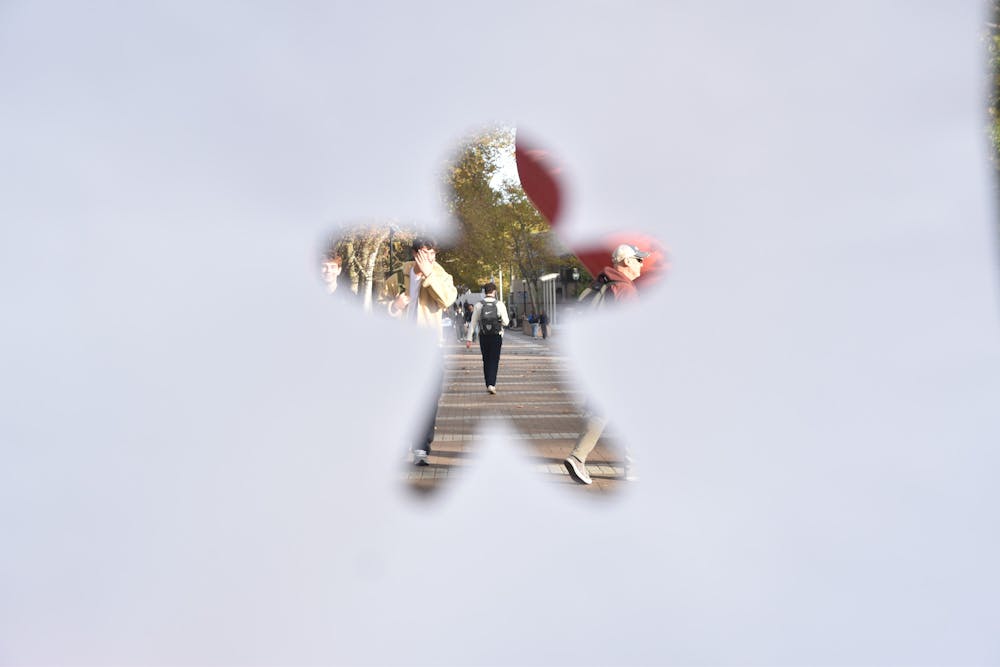
If you decide to take off your headphones while strolling down Locust Walk, you will probably see a group of students walk by. And, chances are, you will probably recognize their shoes, shirts, and, perhaps, the joke one of them just cracked.
This is no accident. Because of social media’s ability to rapidly spread information, many of us see and experience the same trends, from fashion all the way to lingo. As a result, it’s easy to connect with people you’ve recently met, at least on a surface level, as there is a higher likelihood than ever that they are familiar with the pool of information you are drawing from — 75% of college students use social media every day.
As students at Penn, we experience a kind of cultural homogeneity. Just think about the last time you asked a friend, “Did you see that thing on Sidechat?” as if it were common information. This cultural homogeneity exists at pretty much every university, and it can draw us together in the short term. But, what if behind the readily packaged jokes (many of which I crack) is something more alarming: a lack of nuance in our opinions?
Consider a betting house. People go there to bet on horses. It’s risky, but they do it anyway. Quick, fill in the blank: wa_er. You probably said “wager” as opposed to the much more common “water,” just as I did when I first saw this trick. The point is that the initial information shifted my frame of reference. And the same is true in our daily lives, where we consume information both consciously and unconsciously.
We live in an age where the most readily digestible information is king — the kind of information you can absorb in a 15-second video. Yet this information is simplified, as there is only so much of it that can be squeezed into a short video format. As students who are surrounded by these bits of information on social media, our views will almost inevitably also become more simplified. I’ve been involved in numerous discussions where I or one of my friends has made a point that was such an utter simplification of a situation that I could barely understand where the view came from, and I’m sure you have too.
George Orwell understood the consequences of a collectively shrunken perspective, depicting a world in his novel “1984” where people fear divergence from the ideals of the party, partly because those basic ideals permeate every part of the society, from the posters outside to what people say to each other. While “1984” is an extremely embellished version of reality, at some point or another, we have all felt the weight of the majority opinion on campus even when that opinion was an oversimplification. When these opinions remain in the realm of fashion or lingo, they are harmless. However, as these oversimplified opinions jump to more pressing issues, such as politics, they begin to pose a much larger issue. A cycle like that in “1984” emerges where simplified opinions influence people, causing them to consume more of those opinions until there are only a few “acceptable” points of view.
At a school that preaches diversity, we rarely talk about perhaps its most important tenet: diversity of opinion, which feels all the more necessary if we want to progress as students. Isn’t that what college should be about: expanding your views instead of shrinking them?
Orwell presents the worst-case scenario of a society where there is no diversity in thought. It is a place where not only your actions, but also your thoughts are not even your own. And if your thoughts aren’t even your own, what does that make you? I’m not here to say that Penn is like Oceania, or even close. Yet, it seems that we need to make a more conscious effort to form our own opinions for the sake of both ourselves and the community as a whole.
So, the next time you feel the weight of some new trend or idea, at least question the thoughts that come to mind and make sure they are your own.
ROSHAN GOPAL is a College first year studying mathematics from New York. His email is rgopal@sas.upenn.edu.
The Daily Pennsylvanian is an independent, student-run newspaper. Please consider making a donation to support the coverage that shapes the University. Your generosity ensures a future of strong journalism at Penn.
Donate






